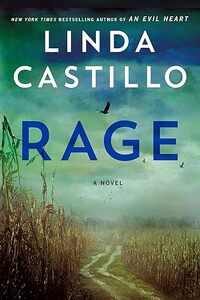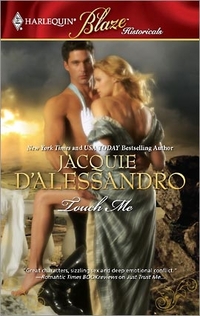 RAGE |
 Fall headfirst into July’s hottest stories—danger, desire, and happily-ever-afters await. |

Purchase
Harlequin Blaze Romance Historical Excerpt of Touch Me by Jacquie D'AlessandroLittle Longstone, Kent, 1820 Genevieve…alabaster box…letter inside proves who did this… The Earl of Ridgemoor's dying words echoed through Simon Cooperstone, Viscount Kilburn's mind as he stealthily approached the cottage nestled among soaring elms, words the earl had gasped out with his last few breaths to Simon's urgent question: "Who shot you?" With any luck, Simon was about to find out the answer—and catch the killer trying to frame him for the earl's murder. The radical social reforms advocated by the earl—a man rumored to be the next prime minister—weren't universally popular. An attempt had been made on Ridgemoor's life two weeks earlier, an act Simon had already been investigating as part of his duties for the Crown. Now it was too late. Whoever had wanted Ridgemoor silenced had succeeded on their second attempt, something that filled Simon with a sick sense of guilt and failure. Since becoming a spy for the Crown eight years ago, he'd suffered several unsuccessful missions, but none that had cast suspicion on Simon himself. Unfortunately, this failure had done just that—Ridgemoor's butler had discovered him standing over the earl's dead body, holding a pistol. Simon had gone to the earl's town house after receiving a note stating that Ridgemoor had important information to share. Sadly, Simon had arrived too late. The butler swore to the authorities that no one other than Simon had entered the house, and indeed, all the windows were locked from the inside. When Simon saw the flickers of suspicion in his superior's eyes, he knew trouble was brewing. John Waverly, the man to whom he reported, hadn't said anything to indicate he doubted Simon's account, but Simon had sensed the man's hesitancy, and it had hurt more than he cared to admit. Eight years ago, Simon had known nothing about being a spy. In fact, he'd known nothing other than the wealth and privilege afforded him by his exalted title and family name. He'd wanted, needed, a change—needed to do something useful with his life—and John Waverly had taken him under his experienced wing and taught him the intricacies of the spy game. He'd always considered Waverly more than merely his superior—he admired and respected him, and thought of him as both a trusted friend and mentor. As if Waverly's uncertainty didn't rankle enough, Simon also saw the glimmers of mistrust in the eyes of William Miller and Marc Albury, his two closest colleagues, men he thought of as brothers. Indeed, he often felt closer to Miller and Albury than he did to his own brother—Simon's spying activities weren't something he could confide to his family or friends. If Miller, Albury or Waverly were in an untenable situation like the one in which Simon now found himself, would he give them the benefit of the doubt, regardless of the evidence pointing toward their guilt? He liked to think so, but perhaps, in the face of such damning evidence, he'd doubt his friends as they were doubting him. With both the king and the prime minister demanding the swift capture of Ridgemoor's murderer, Simon feared speed would take precedence over accuracy, and the wrong man—namely him—could hang for the crime, especially as there were no other leads or suspects. Based on the number of missions that had gone wrong over the past year, Simon, Miller, Albury and Waverly, as well as other colleagues, believed someone within their ranks was a traitor, but so far they'd been unsuccessful in discovering who. All Simon knew was that it wasn't him. Now, unfortunately, it appeared as if he stood alone in that knowledge. Not knowing who he could trust, who had his best interests at heart, he had lied when asked if Ridgemoor had divulged anything to him. Since Waverly, as well as Miller and Albury could smell an untruth at twenty paces, Simon's prevarication had only made matters worse and deepened the suspicion he saw in their eyes. No charges had been leveled against him yet, but his instincts warned him it was only a matter of time. And that was why he needed the alabaster box Ridgemoor had spoken of. Now. So he could reveal the identity of the guilty party before he faced his own execution. With time short, he'd asked Waverly for a leave to clear his name. His superior had studied him at length, then finally nodded and said, "I believe you've lied—and you'd better have a bloody good reason for it—but I don't think you killed Ridgemoor. Still, the evidence against you is damning and if the top demands your head, there won't be much I—or anyone else—will be able to do to help you. I'll give you a fortnight, Kilburn. I'll tell everyone you're recovering from a fever believed to be contagious—that should temporarily keep them away. Do what you have to do to clear your name, and for God's sake do it quickly. I'll work on this end to help you." It was all Simon could ask for and he hadn't wasted any time. His investigations over the past two days since Ridgemoor's murder had led him here—to the home of Mrs. Genevieve Ralston, the woman who, until a year ago, had been Ridgemoor's mistress. Had Ridgemoor's final words meant Mrs. Ralston was involved in the plot to kill him? Or had she perhaps shot him herself? It seemed a good possibility. Information Simon had ferreted out indicated that Ridgemoor had abruptly ended his decade-old arrangement with Mrs. Ralston a year ago. Could she be a woman scorned who'd sought revenge? Or could her motives be of a more political bent? Was she perhaps an enemy of the Crown, one who'd helped get rid of Ridgemoor before he could become prime minister? According to Simon's sources Mrs. Ralston rarely left her property in the small country village of Little Longstone, and the earl had been murdered in London. But then, London was only a three-hour carriage ride away. What better ruse than to be a recluse and sneak away unseen to commit crimes? Tonight, for instance, Mrs. Ralston had left her cottage five minutes ago. She had only one servant, a giant of a man named Baxter, who Simon had ascertained was currently sitting in a booth at the village pub, a tankard of ale in his hand. So long as Mrs. Ralston returned home before Baxter, no one would know she hadn't spent the evening in her cottage. No one except whoever she may have gone to see. And Simon. Standing in the deep shadows cast by the tall trees surrounding her home, Simon had watched her walk down the path which led to the hot springs on her property as well as to a pair of neighboring cottages. He'd learned that one of those homes was currently unoccupied, and the other had been let several months ago to an artist, Mr. Blackwell. Was Mrs. Ralston heading for the hot springs, or for a visit with the artist? Or did she have another destination in mind? Simon didn't know. And as much as he'd wanted to follow her, right now her cottage was empty and he needed to take advantage of the opportunity to find the alabaster box containing the proof that would clear his name. Crouching low, he sprinted the short distance to the cottage. Slipping a thin strip of metal between the nearest French windows, he expertly finessed the tool over the lock. Good fortune was with him as clouds momentarily obscured the stars and moon, casting the area in unrelenting blackness, which suited his purposes perfectly. He pulled in a slow, deep breath of cool air scented with the first hints of autumn, opened the window and slipped inside a well-appointed sitting room. As he searched, taking care to leave everything exactly as he found it, he noted that Mrs. Ralston had an excellent eye for furnishings and a weakness for artwork. Framed pieces adorned the cream-colored walls, everything from landscapes to sketches to framed poetry to portrait miniatures. Based on what little he'd been able to find out about her since he'd first heard her name just two days earlier, Genevieve Ralston was not a rich woman, yet her possessions spoke of understated wealth. How could she afford such trappings? Gifts from a generous benefactor—or payment for murder? A loud meow broke into his thoughts and he looked down. An enormous black-and-white cat stared up at him, its fluffy tail twitching. "Are you friend or foe?" he murmured. The cat rubbed its whiskers against his boots then twined its furry self between his feet. "Friend, then." He crouched down to scratch behind the beast's ears and was rewarded with the loudest purr he'd ever heard. "You like that, don't you." A smile pulled at his lips when the cat answered with what sounded like a feline sigh of bliss. "You must be a lady. You're much too pretty to be a boy." She flicked her tail and moved just out of his reach, then looked at him as if to say, "If you want to continue to pet me, you'll have to come over here." A chuckle tickled Simon's throat. Definitely a female. He stretched out his arm and gave the cat one last scratch, then rose. "As grateful as I am that you're not a large snarling dog, I'm afraid I have no more time for you." Precisely. Time was ticking and the alabaster box was nowhere in the sitting room. He moved on to the dining room, library and morning room, with the cat following him, weaving between his legs at every opportunity. Artwork and finely crafted furniture filled each room, but he found nothing resembling the box he sought. Tamping down his frustration, Simon climbed the stairs and made his way to Mrs. Ralston's bedchamber. After closing the door behind him to keep out the overly curious cat, he glanced around, noting it was the most richly appointed room in the house. Moonlight now streamed in through the windows flanking the four-poster bed covered with a pale-green counterpane and accented with fluffy pillows. Opposite the bed was a dresser and an oval cheval glass. A massive carved-wood wardrobe and dressing screen occupied the far wall, while a feminine escritoire and a chintz-covered chair lined the other. More framed artwork hung on the pale-gray walls, but the most striking object in the room was a life-sized statue of a woman wearing nothing save a secretive smile. She stood in the corner beside the escritoire, a reigning goddess of pure-white marble that glowed in the moonlight. One of her graceful hands extended outward in invitation, and Simon could almost hear her teasingly whisper Touch me. In her other hand, she held a bouquet of flowers between her breasts, the petals of one bloom curving to touch her nipple. She was so lifelike, Simon found himself tempted actually to touch her to assure himself she wasn't real. Pulling his gaze from the statue, he crossed to the wardrobe. An examination of the contents revealed that Mrs. Ralston preferred simple yet exquisitely made gowns in fine materials and owned more bonnets and shoes than any woman could possibly require. His brows raised when he discovered a small, pearl-handled pistol tucked inside a boot in the back of the wardrobe. Clearly, in spite of living in a sleepy little village, Mrs. Ralston felt the need for protection. From what? Or whom? Did she fear for her safety because she was guilty of something—such as the death of her former lover? So many questions regarding this woman… questions, he suspected, that would lead to the answers he sought regarding Ridgemoor's death, thereby proving Simon's innocence and saving his neck from the hangman's noose. He continued on to the dresser. Several pale strands of Mrs. Ralston's blond hair were trapped in her brush. He lifted the cut-crystal perfume bottle to his nose and sniffed. She liked the scent of roses. Small ceramic pots on the dresser top contained an array of feminine creams and potions. The first two drawers revealed dozens of pairs of gloves, in a dizzying variety of styles, materials and colors. Bloody hell, her weakness for shoes and bonnets didn't begin to compare with her apparent addiction to gloves. The other drawers revealed chemises and stockings so sheer they were nearly transparent. Simon well knew that the more sheer the underclothes, the more costly they were. Obviously Mrs. Ralston had done very well for herself. Because she traded in secrets and murder plots that impacted national security? He slipped his hands beneath the filmy undergarments and stilled when his fingers brushed something hard. His pulse kicking with excitement, he slipped the object from its hiding place. An alabaster box. With a rush of satisfaction, he moved closer to the beam of silvery moonlight and turned the book-sized object in his hand. A quick examination revealed it wasn't an ordinary box, but a puzzle. Bloody hell. He'd opened boxes such as this—depending on the intricacy of the pattern involved, it could require anywhere from a few minutes to several hours to find the correct combination of moves to release the top. He hoped like hell it would only require a few minutes. Employing the calm patience that had served him well through the years, he pressed his fingers over the cool, smooth surface, searching for a panel that would slide. The previous boxes he'd opened had been made of wood inlaid with intricate designs, which had made finding the sliding panels a bit easier. This box, however, looked like a solid piece of alabaster and contained no markings other than the pale swirls of color that naturally occurred in the mineral. Several minutes passed before he finally touched the right spot and a slim section of alabaster slid forward. He continued, painstakingly touching the box again and again until he discovered the next small section to slide into place. For the next quarter hour, the only sound in the room was the ticking of the mantel clock as he turned the box over and over, working the intricate pattern of sliding pieces. Finally he slid the piece into place that released the top of the box. At last. The evidence he needed would, in mere seconds, be his. Simon drew a deep breath then slowly slid back the top panel. And stared into an empty cavity. He frowned, slipping his fingers all around the inside the chamber, but it was indeed empty. Bloody hell. Where was the letter? The proof he needed to save his neck? His lips flattened into a grim line. It seemed clear that Mrs. Ralston had found the evidence before he could. Why would she remove it? The fact that she must have done so certainly pointed directly toward guilt of some sort. Had she acted alone in the plot to kill Ridgemoor, or was she in collaboration with others? What role did she play in this circle of death closing in on him? And what the bloody hell would she have done with the information? Hidden it somewhere else in the house? " Excerpt from Touch Me by Jacquie D'Alessandro |
|
| |||
|
||||



 © 2003-2025
© 2003-2025